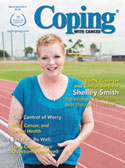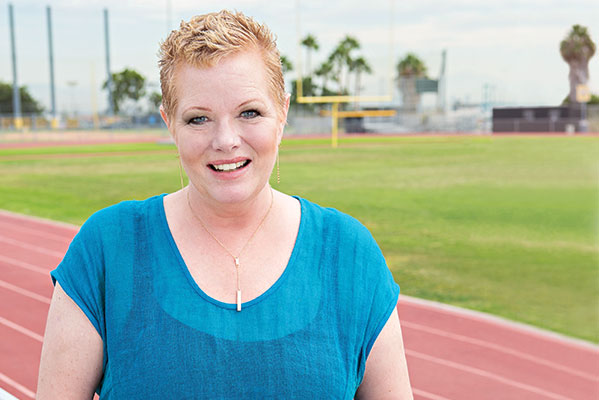ESPN Reporter and Cancer Survivor Shelley Smith Shares Her Story
by Kaylene Chadwell
If you follow sports, you’ve probably seen Shelley Smith – a lot. The longtime ESPN reporter (she’s been with the network since 1997) and current SportsCenter correspondent has covered just about every sporting event in existence, racking up four Emmys in the process. It’s safe to say that Shelley is one of ESPN’s most recognizable on-air personalities.
Last spring, Shelley became even more recognizable when she appeared on ESPN completely bald after undergoing treatment for breast cancer. Recently, she talked with Coping® magazine about taking on breast cancer, how she handled her chemo-induced hair loss, and the unlikely place where she found support.
On finding out she had breast cancer
In early 2014, Shelley unwittingly started down a life-changing path when she found out a close friend was diagnosed with triple-negative breast cancer. The news prompted Shelley, age 55 at the time, to go in for a mammogram; something she hadn’t done in a couple of years. Later that day, she flew to Oklahoma City for the NBA Conference Finals, putting the cancer screening behind her. When she hadn’t heard from her doctor after a few days, Shelley assumed everything was fine.
However, her world was shaken when she ultimately did get that call. She had breast cancer, which a biopsy later revealed had spread to her lymph nodes.
“I was terrified,” Shelley admits. “Then they told me I needed chemotherapy and radiation, and I really lost it. I had uterine cancer before, but they just took out my uterus and I was fine. I figured this would be like that – just go in and cut it out. Then my doctor explained to me, ‘No, this is going to be a marathon. This is not going to be over in June.’”
After making a treatment plan with her doctor, Shelley immediately began taking an estrogen blocker to help shrink the tumor and improve her chances of being a candidate for lumpectomy. The protocol worked. Shelley says, “By the time I went into surgery [after six months of anti-estrogen therapy], my doctor was able to take out the mass, get clear margins, and basically save my breasts.”
Hair has been such a big part of my career. I’ve had big hair, curly hair, short hair, long hair, but never no hair.
On going public with her diagnosis
Shelley didn’t share her breast cancer diagnosis with the public right away. She waited until October – Breast Cancer Awareness Month, fittingly – before announcing the news on Twitter.
“I now join the one in eight women who are battling breast cancer. Early detection will save my life. Tell loved ones,” she wrote. “My tough cancer treatment will begin in January. Until then, I spread the praise of mammograms and ultrasound. Early detection. I am strong and positive as I fight this, just like so many of my breast cancer warrior sisters. We’re Gonna Win!”

The social media site ended up being an unexpected source of support for the veteran sports journalist. Almost immediately, Shelley received overwhelming messages of support and encouragement from those in the sports world and cancer survivors alike.
“I remember the night before I posted saying to my daughter ‘Should I tell people?’ By this time, I had a pretty winnable plan. If I hadn’t, I don’t know that I would have gone public,” Shelley confesses. “But I just said, ‘I’m gonna do it. No one’s going to pay attention anyway.’ I was really, really wrong about that. It went viral.
“People were so supportive,” she adds. “Twitter can be a very cruel tool, and it suddenly became a source of support for me. There would be nights I would wake up and just read the tweets people posted. It helped knowing I had so much support out there.”
On making it through treatment (and its side effects)
Three months after taking to Twitter with her announcement, Shelley underwent a lumpectomy, followed by radiation and chemotherapy. The thought of chemotherapy scared her at first, but Shelley says she soon realized that by having to go through chemo it meant she had a chance to fight this disease. “I’m lucky that I have a fight,” she says. “So many people out there would love to have this fight.”
Still, the beautiful redhead did have some reservations about losing her hair. “Hair has been such a big part of my career,” Shelley admits. “I’ve had big hair, curly hair, short hair, long hair, but never no hair. And then a friend of mine, a former oncology nurse, said to me, ‘When you lose your hair, it just means the chemo is working.’ And that took away all the fear I had about losing my hair.”
I’m stronger inside than I ever thought I could be. I can take on anything now.
It may have also helped spur her bold decision to forgo wearing a wig during her ESPN broadcasts. Instead, she made headlines by returning to television confidently bald. “I thought there should be no stigma for losing your hair because of chemotherapy,” she asserts. “It’s a very personal decision whether to go bald or wear a wig. I don’t fault anyone who wears one, but it just wasn’t for me.”
While battling cancer, Shelley also fought off two infections and the flu. She says that getting her stamina back was the most difficult obstacle she faced during treatment and recovery, especially with her busy career. “I was very sick,” she confesses. “It was really hard when I started back to work. Getting my energy back was tough. And I had chemo brain.”
Though it took her some time to get back into the full swing of things – being in a career that keeps you constantly moving isn’t easy for anyone – she says she now has the energy to work the 20-hour days that are sometimes sprung upon her. “What I’ve realized is that I’m stronger inside than I ever thought I could be,” she reflects. “I can take on anything now.”
On the future
Though Shelley’s cancer has been deemed N.E.D. – no evidence of disease – she will still undergo regular tests to confirm her cancer-free status. She says she will also take the estrogen-blocker Arimidex for the next nine years to help ensure that her cancer doesn’t come back. “There’s always a fear of recurrence, but I refuse to live in fear,” she avows.
Shelley says she plans to continue to work with ESPN, but she doesn’t know where the job will take her. That’s what she loves about it. She also wants to keep speaking out about breast cancer and urging women to get mammograms. “I’m not happy I went through cancer,” she muses. “But if somebody has to go through it, I’m glad it was me. The thing that makes me the happiest is when someone says, ‘I just got a mammogram for you.’”

This article was published in Coping® with Cancer magazine, March/April 2016.


